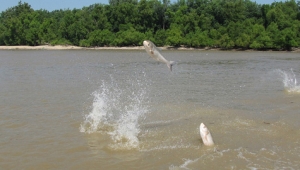
By Illinois Radio Network
SPRINGFIELD – Outdoor sports advocates and environmentalists said Gov. J.B. Pritzker has been dragging his feet on allowing the U.S. Army Corps of Engineers to get started on a plan to keep Asian carp out of Lake Michigan despite committing to the study in April.
Seven nonprofit groups sent Pritzker a petition signed by 3,894 residents of the Great Lakes region urging the governor to sign the formal agreement with the U.S. Army Corps of Engineers, the last hurdle before they can begin the planning, engineering and design, or PED, process of fortifying the Brandon Road Lock and Dam in Joliet.
In April, Pritzker said he was concerned about the cost of the project, but indicated he would support the beginning engineering and design work on it.
“I will not sign a Project Partnership Agreement without a cost control strategy and additional cost sharing among the states,” Pritzker said at the time. “However, the State of Illinois is willing to move forward to preconstruction, engineering and design on the project.”
In that April statement, the governor and others said they were wary about moving forward without assurances that the state wouldn’t get stuck with the lion’s share of the bill.
Illinois has devoted $2 million for the design work and other states had pledged financial support, but the potential cost of the estimated $778 million project could be much higher.
The governor’s office did not respond to questions about the petition on Tuesday.
“Fortifying Brandon Road Lock and Dam is a critical next step to keep invasive Asian Carp from creeping any closer to Lake Michigan and crashing our regional economy,” said Joel Brammeier, CEO of the Alliance for the Great Lakes. “We are hopeful that Governor Pritzker will listen to his constituents and sign the agreement soon so that the U.S. Army Corps of Engineers can move to the next phase of the project.”
If approved by Congress, the Corps would begin the preliminary work on the combination of acoustic, air and electric barriers at the dam. This would be the most effective way of preventing the spread of the invasive fish that could threaten the multi-billion dollar boating and fishing industries in the Great Lakes region, according to the U.S. Army Corps of Engineers.
Illinois Radio Network can be reached at [email protected].






